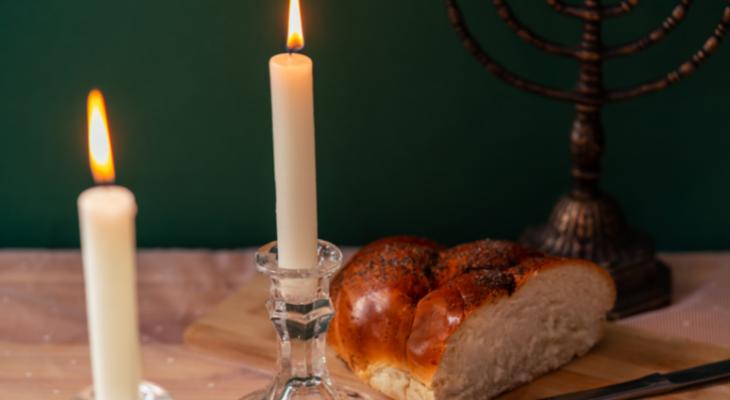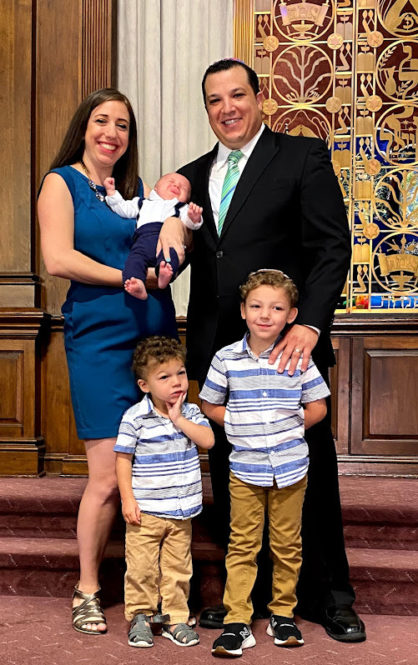My Theology of Interfaith Connection Through A Judaic Lens of Giving
April 11, 2022

This article was originally published on March 25, 2022.
In Pirkei Avot, the Ethics of our Ancestors it reads: “The world stands on three things: The Torah, Sacred Service to God, and the Community and Acts of Loving Kindness.”
For a brief time, I lived in an absorption center in Arad, a small town in Israel. It was there, living with immigrants from Russia and Ethiopia that I experienced a feeling of being both disconnected or lost and connected to those around me though we could barely communicate. Learning about other communities pushed me to think about who I wanted to be and how I envisioned myself in the world. We struggled to communicate, I clumsily learned their folk dances, and patiently found a pathway to discover one another’s core passions. What, I then had to ask, are mine?
Living in the absorption center with borrowed, worn furniture in a small apartment, surrounded by new immigrants linked me powerfully to my own history. My grandfather was a survivor of the Holocaust, a refugee, who himself had landed in centers like this one. He arrived at a place like this, where he had no possessions and no community, none. My grandfather, Michael Danziger, lost his entire world and family during the atrocities of the Holocaust, and then built a life with help from his community. Determined to rebuild he established a successful business, created a beautiful family, and attributed his survival to his faith in Judaism. He was always forging a path, building community, and finding good in others when he himself had been through despair.
I grew up in an Orthodox Jewish home; a bubble which included Jewish schooling, summer camps, and youth groups. I married into a family that is also devoted in their Jewish practice, but includes Rabbis across the denominational spectrum including Conservative, Orthodox and Reform Rabbis. Growing up, I pushed away my faith, feeling like it restricted me, and was forced upon me. Now, I’m grateful to my parents who raised me in an environment that fostered doing good for others within the context of Judaism. We packed boxes of food for Passover for those in need, prepared “matanot l’evyonim” (gifts for the needy) or “mishloach manot” (goody baskets) for Purim. I was purposefully raised with a deep tradition of giving.
Share
Related Articles

Orly and her family
As an adult, I have come to appreciate the values of my childhood. My husband and I are raising our children in a home that is both observant and sensitive to contemporary challenges, to equity and to justice. We are a unique blend of tradition and modernity, and it is for us a meaningful mix of our Jewish backgrounds. I find joy in sharing these traditions of giving with my children, cultivating kindness and empathy in them by taking them to pack food at the ARK, a Jewish food bank, or by raising funds from their lemonade stand to donate to important causes, both secular and Jewish. I take pride in explaining our traditions and holidays to my children and examining the importance of Tikun olam (repairing the world). In Deuteronomy 15:11 it says “There will always be poor people in the land. Therefore, I command you to be openhanded toward your fellow Israelites who are poor and needy in your land.” My goal is to both foster in my children a heart of giving and instill in them the drive to become leaders who will stand up for others.
In Leviticus, we read “love your neighbor as thyself” (Leviticus 19:18) and I was taught that this is the essence of the entire Torah. Therefore, I march with communities of color calling for racial justice. I promote love thy neighbor when braiding a rainbow challah for Shabbat and support the LGBTQ community, teaching my children about accepting the other through a Jewish lens.
My intention is to build my family’s character through my inherited Jewish tradition. It links me to my past and to future generations. I bring honor to my traditions by sharing them with others. When we brought our three sons into a sacred covenant through circumcision, we charged them with the lifetime missions to live up to their given Hebrew names. We hope our oldest, whose name means “strength,” can be a strong and outspoken leader who will positively influence others. Our middle son’s name means “the light of springtime,” our hope is that he shines light to the world even in the darkest times. Our youngest’s name translates to both “God’s strength” and “gift,” and we pray he is a gift to the world, giving strength to others.
My interfaith theology is built on a foundation of my Judaic education, and through community, compassion, service, and sacred traditions, as well as my thirst for justice, and equity, I can work to reshape and repair the cracks in the world. My intention is to create bridges where I step and improve dialogues when I speak, as I have learned that a small act can prove large in someone else’s shoes.
Orly Zinkow believes that interfaith communication and cooperation can foster equitable and inclusive social change. She is a mother to three young boys and a dog, and enjoys spending time creating art and seeing live music.



